Calle Real | |
|---|---|
| Origin | Stockholm, Sweden |
| Genres | Timba, Salsa |
| Years active | 1999 — present |
| Labels | Calle Real, Redline Records |
| Members | Thomas Sebastian Eby Karl Frid Nils Janson Jacek Onuszkiewicz Patricio Sobrado Gunnar Thullberg Kristian Persson Andreas Unge Rickard Valdés Harry Wallin Michel Zitron Peter Fredriksson |
| Website | www.callereal.se |
Calle Real is a Timba band from Sweden founded in 1999. Calle Real currently has twelve members who play modern timba music with various influences. The music is well arranged and suited for the club scene. There is a definite, heavy and unique groove with a sound that differs from many other bands. The music of this band contains some elements of various musical genres.
The band was founded towards the end of 1999 by Patricio Sobrado, initially as a trio, playing traditional Cuban music in the style of the Buena Vista Social Club. Since then, new musicians have joined the band while others have moved on. The group has changed its style to timba.
Today, Calle Real consists of the following members:
Thomas Sebastian Eby - lead vocals
Patricio Sobrado - tres, backing vocals & band leader
Karl Frid - giro, backing vocal & trombone
Gunnar Thullberg - keyboard & guitar
Andreas Unge - bass
Rickard Valdés - congas & timbales
Harry Wallin - drums & timbales
Michel Zitron - backing vocals
Kristian Persson - trombone
Peter Fredriksson - trombone
Jacek Onuskiewicz - trumpet
Nils Janson - trumpet
Several of them have spent long periods in Cuba and have studied music, although no one in the band is actually Cuban except Rickard Valdés, who is the son of the legendary pianist Bebo Valdés and who is half Cuban. The band members are ethnically diverse - Patricio Sobrado of Chilean origin, while trumpet player Jacek Onuskiewicz and the trombone player Cezary Tomaszewski are from Poland. Nevertheless, all of them grew up in Sweden.
In 2003, the band received an invitation to play at a festival in Cuba. It is a festival that assembles the best traditional music and timba bands in Cuba and which also invites some international acts. The entire performance was filmed, which resulted in a music documentary Spelplats Cuba (A Gig in Cuba), later shown at the Gothenburg Film Festival in 2005 and bought by Swedish Television.
Over the years, Calle Real has also played at Swedish festivals like Folkmusikfestivalen in Umeå, Urkul, Linköping Jazz & Blues as well as the Stockholm Jazz Festival and Göteborgskalaset. They have also performed at several other places around Sweden.
Timba is an afro-Cuban music style which developed from traditional Cuban music and great many inspirations from world music, and often contains a hard beat and a heavy bass. It was initially created during the late 1980s by leading Cuban bands, foremost NG La Banda. It was further developed by groups like Charanga Habanera, Isaac Delgado, Paulito FG and Los Van Van.
The fact that Calle Real was able to adopt this style is somewhat remarkable despite growing interest in Spanish and Latin-American culture. Most impressive of all is the fact that a group of young Swedish musicians have successfully mastered this complex style of Cuban. Calle Real is able to successfully mix many different musical influences without losing the Cuban style.
For the most part, the members of Calle Real compose and write the music themselves. Though their sound is influenced by other bands, it is nevertheless distinct in style and fresh. When the band was in Cuba, it received extremely positive reaction, with Cubans believing the music to be new and exciting.
In 2004 the band received a recording offer from Swedish hip-hop label Redline Records. The band recorded five songs, which eventually led to the group's debut album "Calle Real con Fuerza". The album was released in Sweden on 1 March 2006.
| Con Fuerza (2006) | Me Lo Gane (2009) |
|---|---|
| 1) Somos Calle Real | 1) Somos Familia |
| 2) El momento | 2) El amigo Jose |
| 3) Esperanza | 3) Me lo gane |
| 4) Rompiendo murallas | 4) Jugando Super Mario Bros. |
| 5) Rumba de la Calle( Ambience) | 5) El anillo |
| 6) Soy bueno, soy malo (La Rosa) | 6) Los dos sabemos |
| 7) El Beso | 7) La eternidad del amor |
| 8) Amor tal vez perdido | 8) Mi Melodia |
| 9) Dime que me quieres | 9) El Dony |
| 10) Princesa (Timba) | 10) Abreme La Puerta |
| 11) Sueña conmigo | 11) Loco |
| 12) Ya lo sé |
Dime Que (2015)
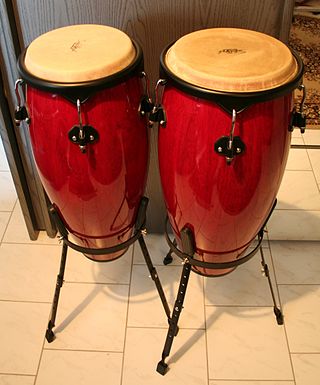
Salsa music is a style of Latin American music, combining elements of Cuban, Puerto Rican, and American influences. Because most of the basic musical components predate the labeling of salsa, there have been many controversies regarding its origin. Most songs considered as salsa are primarily based on son montuno and son cubano, with elements of guaracha, cha-cha-chá, danzón, descarga, bolero, guajira, rumba, mambo, jazz, funk, R&B, rock, bomba, and plena. All of these elements are adapted to fit the basic Son montuno template when performed within the context of salsa.

Los Van Van is one of the leading musical groups of post-revolutionary Cuba. It was founded in 1969 by bassist Juan Formell, who directed the band until his death in 2014. Formell and former band members Changuito and Pupy are some of the most important figures in contemporary Cuban music, having contributed to the development of songo and timba, two popular dance music genres.
Mozambique refers to two separate styles of music.
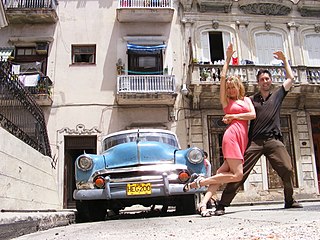
Timba is a Cuban genre of music based on Cuban son with salsa, American Funk/R&B and the strong influence of Afro-Cuban folkloric music. Timba rhythm sections differ from their salsa counterparts, because timba emphasizes the bass drum, which is not used in salsa bands. Timba and salsa use the same tempo range and they both use the standard conga marcha. Almost all timba bands have a trap drummer. Timbas also often break the basic tenets of arranging the music in-clave. Timba is considered to be a highly aggressive type of music, with rhythm and "swing" taking precedence over melody and lyricism. Associated with timba is a radically sexual and provocative dance style known as despelote. It is a dynamic evolution of salsa, full of improvisation and Afro Cuban heritage, based on son, Rumba and mambo, taking inspiration from Latin jazz, and is highly percussive with complex sections. Timba is more flexible than salsa and includes a more diverse range of styles. Timba incorporates heavy percussion and rhythms which originally came from the barrios of Cuba.
Songo is a genre of popular Cuban music, created by the group Los Van Van in the early 1970s. Songo incorporated rhythmic elements from folkloric rumba into popular dance music, and was a significant departure from the son montuno/mambo-based structure which had dominated popular music in Cuba since the 1940s. Blas Egües was the first drummer in Los Van Van, but it was the band's second drummer, José Luis Quintana "Changuito", who developed songo into the world-wide phenomenon it is today.

Pupy y Los que Son, Son was the band of the Cuban musician Cesar "Pupy" Pedroso, founded in 2001. "Pupy" Pedroso died in July 2022.
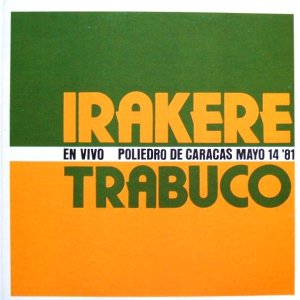
Irakere & Trabuco - En Vivo, Poliedro de Caracas, Mayo 14' 81 is a Vinyl-LP live album released in 1982.
Irakere is a Cuban band founded by pianist Chucho Valdés in 1973. They won the Grammy Award for Best Latin Recording in 1980 with their album Irakere. Irakere was a seminal musical laboratory, where historic innovations in both Afro-Cuban jazz and Cuban popular dance music were created. The group used a wide array of percussion instruments like batá, abakuá and arará drums, chequerés, erikundis, maracas, claves, cencerros, bongó, tumbadoras (congas), and güiro.
NG La Banda is a Cuban musical group founded by flutist José Luis "El Tosco" Cortés. NG stands for nueva generación. NG La Banda are the creators of timba, the most important popular dance and music genre of the past two decades. Prior to founding NG La Banda, Cortés played in the Afro-Cuban jazz-fusion supergroup Irakere, and the seminal songo band Los Van Van.

Markscheider Kunst is a ska band from Saint Petersburg, Russia. It plays afro-rock, soukous, ska and reggae. The band was founded in 1992 by geology students from Saint Petersburg. Lead singer Sergei Yefremenko died on 22 January 2024, at the age of 51.
The Umoja Orchestra was a Gainesville, FL-based band whose music incorporated elements from afrobeat, jazz, funk, afro-cuban as well as traditional African, Caribbean and South American styles like salsa and merengue. The band's instrumentation was modeled closely to bands such as Fela Kuti's Africa 70 and the Antibalas Afrobeat Orchestra.
Caribbean Jazz Project was a Latin jazz band founded in 1993. The original group featured Dave Samuels, Paquito D'Rivera, and Andy Narell. After their second album, D'Rivera and Narell left the group, although both returned as guest stars. Under Samuels' leadership, the group explored different genres of latin jazz with a changing membership and numerous guest artists. The band released nine albums under the Caribbean Jazz Project name and one as the featured backing band for jazz singer Diane Schuur. The final album with Samuels, Afro Bop Alliance, featured the Maryland-based Afro Bop Alliance Big Band led by drummer Joe McCarthy and won the 2008 Latin Grammy Award for Best Latin Jazz Album. McCarthy's latin jazz big band continues to record under its own name, and Samuels retains the group's name.
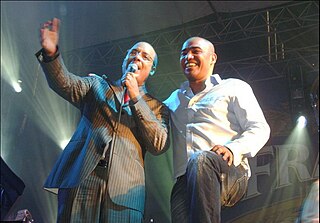
Issac Delgado is one of the founders of the band NG La Banda and is a popular salsa and timba performer.
Candela is a San Francisco-based nine piece salsa music and Latin jazz band created in 1986 under the direction of Uruguayan born lead singer and conga drummer Edgardo Cambón. It consists of piano, bass, trombones, conga drums, bongo drums, timbales, and vocals. "Candela" is one of the "oldest" Salsa Bands, in the Bay Area, having performed consistently an average of 4 performances a month for over 30 years!

Irakere & Trabuco - En Vivo, Poliedro de Caracas, Mayo 15 '81 is a Vinyl-LP live album released in 1982.
Jorge Dalto was a pop, jazz and Afro-Cuban music pianist from Argentina, and the former musical director and keyboardist for George Benson, contributing the acoustic piano intro and solo to Benson's 1976 Grammy-winning hit version of Leon Russell's "This Masquerade". He also performed with Tito Puente, Grover Washington, Spyro Gyra, Fuse One, Gato Barbieri, Willie Colon and others. He died of cancer at the age of 39.

El Bestial Sonido de Ricardo Ray y Bobby Cruz (The Bestial Sound of Ricardo Ray and Bobby Cruz) is the thirteenth studio album released in 1971 by the salsa music duet Richie Ray & Bobby Cruz. Released at the height of their popularity, the album inaugurated a new era in salsa with the inauguration of a new Fania Records subsidiary: Vaya Records. The album, notable for the inclusion of new elements into salsa such as classical music, was an international success, and its title track Sonido Bestial became one of salsa's most popular songs. The album consecrated Richie Ray as a prodigious pianist, capable of playing a fusion of several rhythms and styles.

Afro is an album by trumpeter Dizzy Gillespie, released in 1954 on the Norgran label. Gillespie worked with many Cuban musicians on the album.
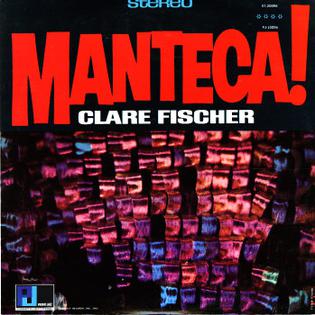
Manteca! is an album by composer/arranger/keyboardist Clare Fischer, released in November 1965 on the Pacific Jazz label. Following his previous album, So Danço Samba, devoted primarily to the music of Antonio Carlos Jobim, and to the bossa nova in general, with this, his first devoted to Afro-Cuban jazz. Fischer also used the occasion to unveil what would become his second bona fide jazz standard, Morning.

Lágrimas Negras is a 2003 album by Cuban pianist, bandleader, composer and arranger Bebo Valdés and Spanish flamenco singer Diego el Cigala. Lágrimas Negras is a fusion of Cuban rhythms and flamenco vocals, produced by Spanish composer, producer and guitarist Javier Limón and book editor, screenwriter, film director and producer Fernando Trueba and released by Calle 54 Records and BMG Music Spain.